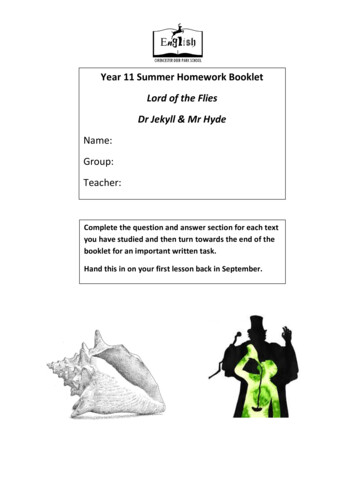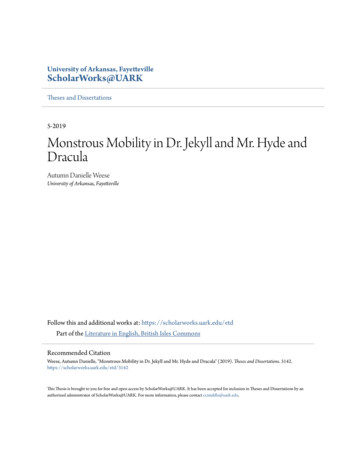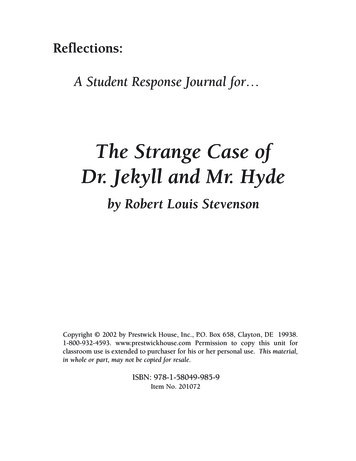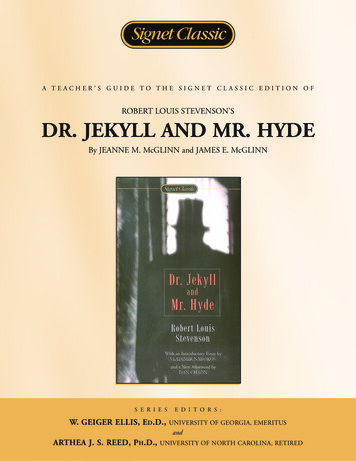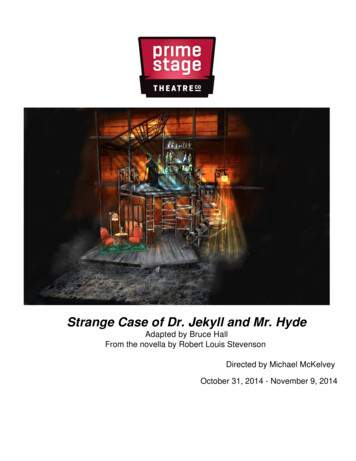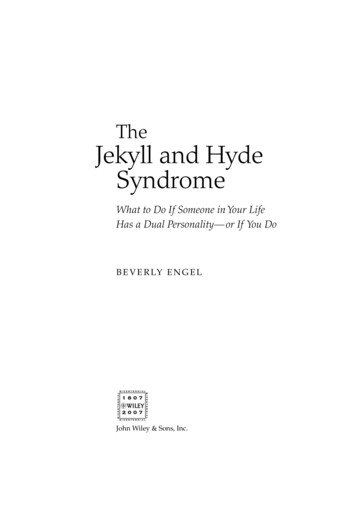
Transcription
ffirs.qxd2/7/079:25 AMPage iiiTheJekyll and HydeSyndromeWhat to Do If Someone in Your LifeHas a Dual Personality— or If You DoB E V E R LY E N G E LJohn Wiley & Sons, Inc.
ffirs.qxd2/7/079:25 AMPage vi
ffirs.qxd2/7/079:25 AMPage iTheJekyll and HydeSyndrome
ffirs.qxd2/7/079:25 AMPage iiAlso by Beverly EngelLoving Him without Losing You: How to StopDisappearing and Start Being YourselfThe Power of Apology: Healing Steps to TransformAll Your RelationshipsThe Emotionally Abusive Relationship: How to StopBeing Abused and How to Stop AbusingHonor Your Anger: How Transforming Your Anger StyleCan Change Your LifeBreaking the Cycle of Abuse: How to Move beyond YourPast to Create an Abuse-Free FutureHealing Your Emotional Self: A Powerful Program to HelpYou Raise Your Self-Esteem, Quiet Your Inner Critic, andOvercome Your Shame
ffirs.qxd2/7/079:25 AMPage iiiTheJekyll and HydeSyndromeWhat to Do If Someone in Your LifeHas a Dual Personality— or If You DoB E V E R LY E N G E LJohn Wiley & Sons, Inc.
ffirs.qxd2/7/079:25 AMPage ivCopyright 2007 by Beverly Engel. All rights reservedPublished by John Wiley & Sons, Inc., Hoboken, New JerseyPublished simultaneously in CanadaWiley Bicentennial Logo: Richard J. PacificoDesign and composition by Navta Associates, Inc.No part of this publication may be reproduced, stored in a retrieval system, or transmitted in any form or by any means, electronic, mechanical, photocopying, recording,scanning, or otherwise, except as permitted under Section 107 or 108 of the 1976 UnitedStates Copyright Act, without either the prior written permission of the Publisher, orauthorization through payment of the appropriate per-copy fee to the CopyrightClearance Center, 222 Rosewood Drive, Danvers, MA 01923, (978) 750-8400, fax (978)646-8600, or on the web at www.copyright.com. Requests to the Publisher for permission should be addressed to the Permissions Department, John Wiley & Sons, Inc., 111River Street, Hoboken, NJ 07030, (201) 748-6011, fax (201) 748-6008, or online athttp://www.wiley.com/go/permissions.Medical disclaimer: The information contained in this book is not intended to serve asa replacement for professional medical advice. Any use of the information in this bookis at the reader’s discretion. The author and the publisher specifically disclaim any andall liability arising directly or indirectly from the use or application of any informationcontained in this book. A health care professional should be consulted regarding yourspecific situation.For general information about our other products and services, please contact ourCustomer Care Department within the United States at (800) 762-2974, outside theUnited States at (317) 572-3993 or fax (317) 572-4002.Wiley also publishes its books in a variety of electronic formats. Some content thatappears in print may not be available in electronic books. For more information aboutWiley products, visit our web site at www.wiley.com.Library of Congress Cataloging-in-Publication Data:Engel, Beverly.The Jekyll and Hyde syndrome : what to do if someone in your life has a dualpersonality—or if you do / Beverly Engel.p. cm.Includes bibliographical references and index.ISBN 978-0-470-04224-3 (cloth)1. Multiple personality—Popular works. 2. Personality disorders—Popularworks. 3. Self-help, Health. I. Title.RC569.5.M8.E54 2007616.85'236—dc222006025165Printed in the United States of America10 9 8 7 6 5 4 3 2 1
ffirs.qxd2/7/079:25 AMPage vThis book is dedicated to all who care about someone whois a Jekyll and Hyde and all who suffer from the syndrome.May you find help and encouragement in the informationand the stories shared here.
ffirs.qxd2/7/079:25 AMPage vi
ftoc.qxd2/7/079:26 AMPage viiContentsAcknowledgmentsIntroductionix1PA R T IUnderstanding the Jekyll and Hyde Syndrome71What Is the Jekyll and Hyde Syndrome?92The Seven Types of Jekyll and Hydes3What Causes the Jekyll and Hyde Syndrome?3253PA R T I IIf You Have a Jekyll and Hyde in Your Life834How to Cope with a Jekyll and Hyde855Abusive or Illusive? 1076If the Jekyll and Hyde in Your Life Has a PersonalityDisorder 1217Deciding Whether to Continue the Relationship8How to Avoid Getting Involved with a Jekyll and Hyde inthe Future 160146vii
ftoc.qxd2/7/079:26 AMPage viiiviiiContentsPA R T I I IIf You Suffer from the Jekyll and Hyde Syndrome9Confronting and Healing Your Jekyll and HydeBehavior 18510If You Are an Abusive Jekyll and Hyde11If You Have a Personality Disorder228PA R T I VThe Jekyll and Hyde within Us All12183253The Lessons of Jekyll and HydeReferences259Recommended Reading 262Index 265255208
flast.qxd2/7/079:28 AMPage ixAcknowledgmentsMy deepest gratitude goes to my wonderful agents, Stedman Maysand Mary Tahan. Thank you both for working so hard on mybehalf. I am also grateful to Tom Miller, my editor at Wiley, forbeing excited about this project from the beginning.I am deeply appreciative of the people who agreed to be interviewed for this book. I learned a great deal from your stories, andI realize that it took tremendous courage for you to share themwith me.My heartfelt gratitude goes to my psychotherapy clients. Youteach me more each day.I wish to thank Connie Zweig and Jeremiah Abrams for theirwonderful book Meeting the Shadow: The Hidden Power of the DarkSide of Human Nature. It must have been no small feat to bringtogether so many experts on the Shadow and combine their articlesto form such a remarkable book.Of course, this book could not have been written without theshort story by Robert Louis Stevenson or the work of Carl Jung. Iam deeply indebted to both of them.ix
flast.qxd2/7/079:28 AMPage x
cintro.qxd2/7/079:29 AMPage 1IntroductionMore than a decade before Freud delved into the depths of thehuman psyche, Robert Louis Stevenson had an extremelyrevealing dream. In it, a man was being pursued for a crime. Heswallowed a powder and underwent a drastic change of character,so drastic that he was unrecognizable. The man, a kind, hardworking scientist named Dr. Jekyll, was transformed into the violent andrelentless Mr. Hyde, whose evil took on greater and greater proportions as the dream unfolded.Stevenson developed the dream into the now famous tale TheStrange Case of Dr. Jekyll and Mr. Hyde in 1886. Its theme has becomeso much a part of popular culture that we often refer to someonewho is exhibiting erratic behavior as a “real Dr. Jekyll and Mr.Hyde.” People have been fascinated with the Jekyll and Hydephenomenon for more than a hundred years now, starting with thepopularity of the Robert Louis Stevenson story. When a story likethis touches so many people in such a profound way, it must speakto a place in us that is universal and instinctive.We’ve all had the experience of being surprised by our moodshifts or shocked by the words that suddenly come out of ourmouths. Many of us have been alarmed that we are capable of1
cintro.qxd2/7/0729:29 AMPage 2THE JEKYLL AND HYDE SYNDROMEbecoming angry, unreasonable people we barely recognize. Thetruth is, we all have the capacity to act in ways that are radicallydifferent from how we normally behave, some people more thanothers. No one is all good or all bad. The difference is that some ofus are able to contain or keep down the so-called bad sides of ourselves and others are not.While each of us does contain both a Dr. Jekyll and a Mr. Hydepersonality—a more pleasant persona for everyday wear and ahiding, nighttime self that remains quiet most of the time—thereare people who live out their lives in these extremes. Loving andkind one moment and angry and punishing the next, these peoplebewilder, hurt, and anger those who are close to them.Although the phrase “Jekyll and Hyde” is commonly used inour culture, few people really understand much about the type ofpersonality that changes so radically for no apparent reason. This isthe first self-help book to explain in detail the various causes of thissyndrome, how it is manifested, and the damage it can inflict onthose who are close to such a person.Who Will Be Interested in This BookThis book will interest many people for different reasons. We eachhave a dark side, a part of us that we keep hidden from others andoften from ourselves. While some of us are better than others atmanaging our dark sides, there are far more people suffering fromthe Jekyll and Hyde syndrome than one might suspect. When welook at the causes of the syndrome, we can understand how thenumbers can add up. For example, many people who suffer fromthe Jekyll and Hyde syndrome have a history of child abuse andneglect. More than 3 million cases of child abuse were reported in1997, according to the National Committee to Prevent Child Abuseand the National Center on Child Abuse and Neglect. Add to thisthe fact that an estimated one in thirteen adults in the United Stateshas grown up with overly controlling parents—another major factor in creating a Jekyll and Hyde personality—and the numbersincrease tremendously. Many people with this syndrome suffer
cintro.qxd2/7/079:29 AMPage 3Introduction3from either borderline personality disorder (BPD) or narcissisticpersonality disorder (NPD). When we add the numbers of peoplewho suffer from BPD (between 10 and 20 million Americans) andNPD (an estimated 5 million Americans), we can see that the numbers are substantial.Readers will learn how to deal with people in their lives (including lovers, family members, bosses, and friends) who behave inradically different ways. Others who are troubled by their ownradical mood shifts, bizarre behavior, and conflicting personalitieswill learn why these things occur and how to begin to integratetheir personalities.There is another important aspect to this book. Oftentimes, theJekyll and Hyde syndrome becomes a form of emotional abuse. Infact, most emotional abusers exhibit some form of the Jekyll andHyde syndrome. Emotional abuse has taken the place of sexualabuse and domestic violence as the most talked about form ofabuse, both in the media and in recovery circles. Perhaps this isbecause in many ways it is the last frontier in terms of facing howabuse permeates and shapes our culture. As I did in The EmotionallyAbusive Relationship, in this book I provide concrete strategies forchange, whether the reader is an emotional abuser or a victim ofsomeone who is emotionally abusive.Although this is primarily a self-help book, it also providesan in-depth exploration of the duality within us all. Importantinformation about Carl Jung’s concept of the human Shadow is provided for readers to gain a deeper understanding of their own Jekylland Hyde tendencies, as well as guidance on how they can learn toembrace their dark sides instead of partitioning them off into separate parts of themselves.In addition to appealing to those who are involved with a Jekylland Hyde and those who suffer from the syndrome themselves, thebook will interest those who are fascinated by people who exhibitthe Jekyll and Hyde syndrome. For example, two years ago thenation became obsessed with the Scott Peterson case—the story ofhow a seemingly good husband and all-around nice guy wasrevealed to be an unfaithful playboy and, even worse, the murdererof his wife and unborn child. People who were close to Scott were
cintro.qxd2/7/0749:29 AMPage 4THE JEKYLL AND HYDE SYNDROMEshocked to discover that he had created a double life for himself. Hewas a doting husband, on the one hand, and a man who hadnumerous affairs, on the other; a man who was seemingly happythat his wife was having a baby and at the same time a man whoshared with others that he did not want to have a child.The truth is, there are many people like Scott Peterson who livedouble lives. Many seemingly exceptional human beings—peoplewho are often kind, giving, and dedicated to helping others—also have dark sides, hidden from their families and friends. In2006, we learned of two more cases of Jekyll and Hyde behavior:Congressman Mark Foley and Reverend Ted Haggard. Underneaththe perfect public persona often lies someone who is the opposite—cruel, selfish, and hurtful to others. Now and then, one of these dualpersonalities gets exposed, and we are always shocked and fascinated to realize they live within our midst.People want to know how a church leader, a boy scout leader,and an upstanding citizen could also be the BTK serial killer. Theywant to know whether Michael Jackson is really as sweet, innocent,and childlike as he appears or whether he is hiding a far more sinister dark side capable of manipulating and molesting children.This book will explain to the lay person why certain people areprime candidates for developing dual personalities and how thesepeople are able to get away with atrocious acts of violence orbetrayal because their good sides are so charming, lovable, orupstanding.When cases like those of Scott Peterson, the BTK killer, andMichael Jackson emerge, we are plagued with questions: How do people like this fool so many people? Why is it that people such as ministers, doctors, and teacherswho do so much good in the world are often the ones who shockus the most with their capacity to harm others? Is there such a thing as having a split personality that causes aperson to behave in these radically opposite ways?In The Jekyll and Hyde Syndrome: What to Do If Someone in Your LifeHas a Dual Personality—or If You Do, readers will get answers tothese questions.
cintro.qxd2/7/079:29 AMPage 5Introduction5In summary, this book explains in detail why certain peopleseem to have two strong sides to their personalities—so much sothat they seem like two distinct people. I provide questionnaires tohelp readers determine whether they are in a relationship with aJekyll and Hyde or whether they themselves suffer from this syndrome. I will help readers who suffer from this syndrome to integrate their personalities and those who are in a relationship withsuch a person to determine whether there is hope for the relationship, whether they and their children are safe with such a person,and whether they should continue the relationship or not.
cintro.qxd2/7/079:29 AMPage 6
c01.qxd2/7/079:30 AMPage 7PA R TIUnderstanding the Jekylland Hyde Syndrome
c01.qxd2/7/079:30 AMPage 8
c01.qxd2/7/079:30 AMPage 91What Is the Jekyll andHyde Syndrome?When she was goodShe was very, very good,But when she was bad she was horrid.—Henry Wadsworth LongfellowWe all experience mood shifts from time to time. We are allmultifaceted people who show different sides of ourselvesdepending on the circumstances and whom we associate with. Andwe are all sometimes shocked by our own actions or by the wordsthat come out of our mouths. Yet there are some people whose moodshifts are far from normal, people who experience radical changes intheir moods or violent outbursts for no apparent reason—peoplewho become enraged, abusive, violent, depressed, or sullen at thedrop of a hat. Some not only show different sides of themselvesdepending on the situation, but they are capable of creating doublelives or entirely different personalities—personalities that would beunrecognizable to people who know them in other contexts.These people suffer from what I call the Jekyll and Hydesyndrome. Someone with the Jekyll and Hyde syndrome seems at9
c01.qxd2/7/07109:30 AMPage 10THE JEKYLL AND HYDE SYNDROMEtimes to be two different people. Many people with this syndromeexperience radical mood swings, often for no apparent reason. Theycan seem happy or normal one minute and the next become deeplydepressed, angry, critical, or afraid. Often, this involves suddenlygetting angry with those who are closest to them. They may fly intoa rage and accuse their partners or children of doing something tohurt them when the other people are totally innocent. Or they maysuddenly become critical, finding fault with their loved ones, theircoworkers, or anyone who is in close proximity.This is how my client Leslie described her husband’s behavior:“You’ll never meet a kinder man than my husband. He is so generous and loving. He has dozens of friends who adore him. And mostof the time he is wonderful to me. But every once in a while something sets him off and he becomes this horrible man who says terribly cruel things to me. He’ll berate me for the smallest things andinsist that I don’t love him, that I’m a terrible wife, that he deservesto be with someone who will treat him better. For years I took hiscomplaints seriously and tried to change the things about myselfthat he didn’t like. But no matter how much I changed, he just keptfinding things to complain about. I’m beginning to think that Ireally have nothing to do with his moods.”Often, the people who experience these radical mood shiftsdon’t seem to be aware that they have changed. Leslie continued:“The scary thing is that when he switches back to his normal self, heoften can’t even remember the cruel things he’s said to me. When Itell him about how he has talked to me, he insists it can’t be true.That’s why I’ve come to realize that it really isn’t me—it’s him.”Instead of getting angry and lashing out at those closest to them,some Jekyll and Hydes suddenly become withdrawn, depressed, orsullen, as was the case with my client Andrew’s wife. “You neverknow when Sheila’s mood will change and she will become withdrawn,” Andrew said. “Sometimes she wakes up that way; othertimes, she’ll come home from work that way. I’ll ask her what iswrong, and she insists that there is nothing going on. But you’dhave to be blind not to see that something is bothering her. Shebarely talks to me or the kids, and she ends up going to bed andstaying there for hours, even days sometimes. Then the mood just
c01.qxd2/7/079:30 AMPage 11What Is the Jekyll and Hyde Syndrome?11seems to pass and she’s her old self again. She refuses to talk aboutwhat happened and gets angry with me if I try to push her. I’velearned to just try to ignore it, but it’s hard on us. I just never knowwhen I’m going to lose my wife and the kids will lose their motherfor several hours or even days. And I feel bad for her—there’s notelling what kind of emotional torture she’s going through.”Two FacesSometimes a Jekyll and Hyde’s duality shows up in the fact that theperson acts radically different depending on whom he or she isaround or often on whether he or she is in a public place or someplace private. Many of them show one face to their friends andthe public while showing another to their partners or families. Forexample, Carl is a mild-mannered project manager for a multimillion dollar corporation. His boss is a tyrant who insists on Carlalways completing his projects perfectly and on time—even whenCarl hasn’t been given adequate lead time. If Carl’s boss finds onemistake or isn’t completely impressed with Carl’s performance, hehumiliates Carl in front of his coworkers. Carl is too intimidated byhis boss to confront him and too afraid he’ll get a bad review andnot be able to find another job if he were to quit. So Carl takes hisfrustrations out on his wife and children. At home with his family,Carl is an entirely different person. At home he is the tyrant.The moment Carl walks in the door, his children are supposedto drop whatever they are doing to come to greet him and report tohim whether they have completed their chores. He then followseach child around the house or the yard, inspecting the area tomake sure the job was done right. If a chore is not completed to hissatisfaction, he insists that the child go back and work on it until thejob is done just right. After finishing their chores, the children mustsit down with Carl and show him their completed homework. Carlis a stickler for perfection and often browbeats a child for gettingsomething wrong. Dinner will be held up for the entire family untilall of the children have completed their homework to their father’ssatisfaction.
c01.qxd2/7/07129:30 AMPage 12THE JEKYLL AND HYDE SYNDROMEWhile many Jekyll and Hydes tend to be abusive when theyswitch over into another personality, others act out dark urges thatare completely uncharacteristic of them. For example, ReverendThomas Henderson is a highly respected minister in a conservativechurch that counsels against drinking alcohol, sex outside of marriage, dancing, and gambling. Although he fervently believes in thechurch and its teachings, Reverend Henderson experiences intensefantasies and desires that he cannot seem to control. He is such acharismatic speaker and is so highly regarded that he is asked to bethe guest minister at various churches around the United States.Unfortunately, traveling to a strange city affords ReverendHenderson an opportunity to act out his darker urges. As much ashe tries to resist, he is too weak to fight them.While he is away, Reverend Henderson takes on anotherpersona—that of a loud, boisterous man who goes to bars, drinks,dances, and flirts with women. If people in his congregation were torun into him, they would barely recognize him. Other than hisphysical features being the same, everything else about ReverendHenderson is different. Gone is his respectful, quiet demeanor andin its place is a vociferous, crude attitude. He even dresses differently. In the place of his conservative suit is a tight T-shirt andjeans. At the end of each evening, Reverend Henderson takes a newwoman back to his hotel room for sex.The Strange Case of Dr. Jekylland Mr. HydeThe Jekyll and Hyde syndrome is named after the classic RobertLouis Stevenson story The Strange Case of Dr. Jekyll and Mr.Hyde. The story is about a man not too different from ReverendHenderson—an upstanding, tee-totaling, philanthropic doctor whoturns into a womanizing, drinking, murderous scoundrel, seemingly overnight. In addition to this being an engaging tale, it isalso much more. It is a metaphor for a phenomenon that is all toocommon—the fact that so-called good people often have a darkside, a part of themselves they keep hidden from themselves and
c01.qxd2/7/079:30 AMPage 13What Is the Jekyll and Hyde Syndrome?13others. In some cases, this dark side actually forms a distinct personality radically different from the public persona, as was the casewith Reverend Henderson. Ironically, it is often people who standout as the most moral, the most kind, and the most magnanimouswho are most likely to fall. It is, in fact, a rule of nature that thehigher up on a pedestal we put ourselves or allow others to put us,the farther we have to fall.For those of you who haven’t read this story (and for anyonewho read it a long time ago), here is the basic plot: Dr. Jekyll worried a little too much about how others perceived him. He had aninvestment in being viewed by others as a pillar of the community,but secretly he had the desire to act out some of his darker urges.And so he concocted a brew that would allow him to venture intothe dark side of human nature, experience its forbidden pleasures,and then return to his more acceptable self, seemingly unscathed.Most important, he didn’t have to take responsibility for what hisdarker self did during his excursions.While many people with the Jekyll and Hyde syndrome are likethe original Dr. Jekyll who completed his transformation in thedarkness of night, with no one else witnessing his change, otherJekyll and Hydes change their personalities or experience theirmood shifts in front of others. For example, a normally pleasant,amiable man can suddenly turn into an insulting, abusive monster,devastating his wife with his sharp criticism of her, going on a rampage and destroying property, or even becoming physically violenttoward his family. A typically doting mother can suddenly burstinto a rage, calling her children horrible names, throwing objectsacross the room, and even driving off without them to teach them alesson.Jennifer devotes her life to her husband and children. She is astay-at-home mom who is usually patient and loving with her children, four-year-old Erin and six-year-old Josh. Yet sometimes, forno apparent reason, Jennifer becomes impatient and critical of herkids and husband. Nothing they do will please her. It’s as if she islooking at them through different eyes. The qualities she complimented them on days earlier seem to have completely slipped hermind, and all she can see are their faults. “It’s all or nothing with my
c01.qxd2/7/07149:30 AMPage 14THE JEKYLL AND HYDE SYNDROMEwife,” her husband, Bill, told me when, out of desperation, he cameto me for help. “You’re either the greatest person she ever met or theworst. When she puts you in the ‘bad’ box, there is nothing you cando to make her like you. I’ve learned to just lay low and wait for herto put me in the ‘good’ box soon. But I don’t want my kids to haveto grow up this way.”How the Jekyll and Hyde SyndromeDiffers from Normal Mood ShiftsThose with the Jekyll and Hyde syndrome do not simply experiencenormal moods shifts and show different sides of themselves theway average people do. What sets people with a Jekyll and Hydesyndrome apart is: The fact that their mood shifts are far more frequent and severethan the average person’s. In many cases, not only do their moods shift but their entirepersonalities change. Often, their sudden mood shifts include an element of abusiveness toward others. They seldom own up to or admit to their severe mood shifts ortheir dual personalities. In fact, some are not aware that theyhave such extreme mood shifts or that they have two distinctivepersonalities. Most will deny any change in their behavior andmay even try to make their partners or others doubt their ownperceptions regarding these mood shifts. Many Jekyll and Hydes are excellent liars who are extremelyconvincing and are experts in denial, distorting the truth, andshifting the blame. Their personality changes often represent deep conflicts withinthemselves (for example, the minister who is vehementlyagainst adultery but has strong sexual urges he cannot control). Their personality shifts or dual personalities are often symptomatic of a personality disorder or are due to previous abuse
c01.qxd2/7/079:30 AMPage 15What Is the Jekyll and Hyde Syndrome?15experiences. (Many people who suffer from the Jekyll and Hydesyndrome were abused in childhood, and many suffer from personality disorders because of it). Some who suffer from the Jekyll and Hyde Syndrome actuallylive double lives. They may be highly respected elected officials,philanthropists, or even members of the clergy who hide a darkside to their personality that causes them to act in ways thatwould be shocking and hurtful to those who hold them in highregard, or they may create dual identities so they can participatein activities that are unacceptable in normal society.The Seven Types of Jekyll and HydesFrom my many years of experience working as a psychotherapistspecializing in abuse, I have determined that there are seven distinct types of Jekyll and Hydes:1. The super nice/abusive person. For most of you reading this book,this is the type of Jekyll and Hyde you are probably concernedabout. This person can be loving and charming one minute andabusive the next. Most often, the abuse takes the form of criticism, insults, and name calling, but at times it can include physical abuse. The person is often apologetic once some time haspassed and goes back to his usual loving self. Yet no matterhow apologetic he is or how many promises he makes to stopbeing critical, before long he has once again slipped back intohis abusive behavior.2. The unpredictable person. You never know when this person willbecome upset, blow up, go on a rampage, become withdrawnand sullen, or completely change her mind about something.Living with this person has been described as “walking oneggshells” because this type of person is exquisitely sensitive,and you never know whether something you say or do willupset her. Often, it is nothing you have done or said, but something that went on in this person’s own mind that created theupset.
c01.qxd2/7/07169:30 AMPage 16THE JEKYLL AND HYDE SYNDROME3. The classic Jekyll and Hyde who truly lives a double life. This personmay be one type of person around his family and an entirelydifferent one while away from them. For example, a hard working married man may appear in public to be the pinnacle ofvirtue, yet may be seeing other women or be involved with illegal activities. He may hold the position of a minister or a priest,or he may have been elected a mayor of a city or a senator of astate. He may be a philanthropist or a highly respectedcelebrity, and yet he has another life in which he goes againsteverything he stands for. Some people with this type of Jekylland Hyde syndrome have set up separate identities, whichincludes going by different names or being married to morethan one person.4. Someone whose personality radically changes when he or she drinksalcohol, takes drugs, or engages in other addictive activities. Like Dr.Jekyll, whose transformation occurred after he took an elixir hecreated in his laboratory, this type of radical shift usually takesplace only when the person is altered due to alcohol, drugs,gambling, and so on.5. The imposter. This person deliberately tries to fool people intothinking he is something he is not. This can include pretendingto be more concerned with the welfare of others or more successful than he is. He regularly lies, manipulates, and deceivesothers.6. Someone whose opinion of others fluctuates drastically. This persontends to view people as either “all good” or “all bad.” When sheviews someone as “all bad,” she is unable to see any redeemingqualities in the person and feels justified in treating him poorlyor rejecting him completely—even if he is her own child.7. Someone who changes dramatically when you challenge him or her inany way. This person can be considerate and agreeable as long asthings go his way or as long as he is i
Strange Case of Dr. Jekyll and Mr. Hyde. in 1886. Its theme has become so much a part of popular culture that we often refer to someone who is exhibiting erratic behavior as a "real Dr. Jekyll and Mr. Hyde." People have been fascinated with the Jekyll and Hyde phenomenon for more than a hundred years now, starting with the
